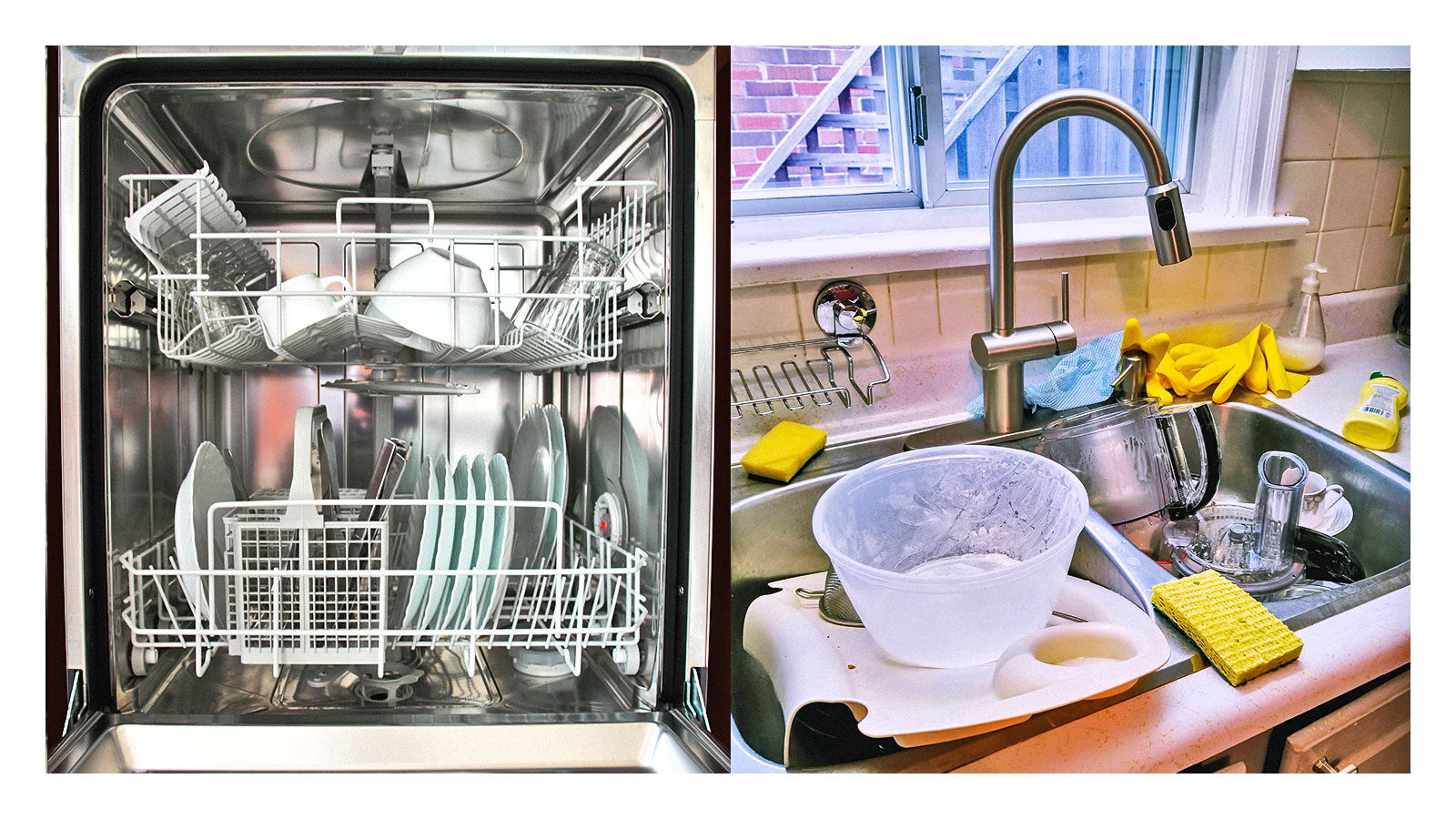Modern dishwashers are generally more water-efficient than washing dishes by hand. Dishwashers can use less water, especially if run with full loads.
Exploring the efficiency of dishwashers compared to hand washing involves considering water usage, environmental impact, and time spent. Household chores like dishwashing have seen a practical evolution with the advent of modern appliances. A common household debate often revolves around the usage of a dishwasher versus traditional hand washing.
Many assume that hand washing saves more water, but studies suggest that energy-efficient dishwashers use less water and energy. They not only conserve resources but also save time, providing convenience and efficiency in the kitchen. Understanding these benefits is crucial for making informed decisions that support a sustainable lifestyle and reduce utility bills. This topic interests environmentally conscious individuals and homeowners seeking to enhance their kitchen’s functionality.

Credit: www.bosch-home.in
Table of Contents
Introduction To Dishwasher Usage
Dishwashers have revolutionized kitchen chores, turning tedious hand-washing into a simple, push-of-a-button task. Efficiency and convenience mark their rise in homes worldwide. As families embrace this modern appliance, the question of water consumption comes to the forefront. Does a dishwasher actually conserve water, or does it run gallons down the drain in contrast to manual washing?
The Rise Of Dishwashers In Modern Households
The adoption of dishwashers has surged over the years, with many viewing them as essential as refrigerators or ovens. Once a luxury, dishwashers are now a staple in kitchen design, prioritizing hygiene and time management. Their benefits include:
- Improved cleanliness – ensuring dishes are sanitized at high temperatures
- Time-saving – freeing up hours that would be spent scrubbing pots and pans
- Accessibility – making kitchen tasks easier for people with physical limitations
Common Beliefs About Dishwasher Water Consumption
There’s a prevalent belief that washing dishes by hand is less wasteful than using a machine. Conversations around conservation often point to manual methods as more eco-friendly. Yet, evidence suggests the reality may differ. Dishwashers designed with advanced technology aim to minimize water usage. The next sections will dive into whether dishwashers truly save water and how they stack up against hand washing.

Credit: grist.org
Analyzing Water Use
Does using a dishwasher really save water compared to cleaning up by hand? This is a vital question for both environmental conservation and reducing household bills. In the quest to uncover the truth, we delve into the specifics of water consumption by both methods.
Measuring Water Used By Dishwashers
To accurately measure how much water dishwashers use, we must look at different models. New Energy Star-certified dishwashers are notable for their efficiency. On average, these machines use about 3.5 gallons (13.25 liters) of water per cycle. Older models might consume up to 10 gallons (37.85 liters). Let’s compare these numbers with hand washing.
Quantifying Water Use For Hand Washing Dishes
Hand washing dishes is quite variable. Techniques and habits differ from person to person. For instance, leaving the tap running uses a lot more water. A running tap can pour 2 gallons (7.57 liters) per minute. Filling a wash basin typically requires about 8 to 27 gallons (30.28 to 102.21 liters). These figures can add up across a full dishwashing session.
Dishwashing Method |
Water Used |
|---|---|
New Dishwasher |
3.5 gallons per cycle |
Old Dishwasher |
Up to 10 gallons per cycle |
Hand Washing (Running Tap) |
2 gallons per minute |
Hand Washing (Basin) |
8 to 27 gallons per session |
Recognizing the exact numbers related to water use in dishwashers versus hand washing unearths valuable insights. It helps prioritize eco-friendliness and cost-effectiveness within the kitchen routine.
Comparative Studies
People often wonder about water usage when washing dishes. Some believe using a dishwasher wastes more water. Others think the opposite is true.
Is washing by hand more eco-friendly? Let’s delve into what comparative studies reveal about this debate.
Research Findings On Dishwasher Vs. Hand Washing
Recent studies have shed light on this topic. They compare water and energy use between dishwashers and hand washing. The results are quite surprising.
- Dishwashers are often more water-efficient than washing dishes by hand.
- Modern dishwashers use as little as 3 gallons per load.
- Hand washing can use up to 27 gallons for the same amount of dishes.
The right technique and efficiency play big roles in water usage.
Dishwashers with the Energy Star label are particularly water-wise.
Factors Affecting Water Usage In Both Methods
Different factors influence how much water we use in kitchens.
Factor |
In Dishwashers |
In Hand Washing |
|---|---|---|
Load Size |
Fixed water usage |
Varies greatly |
Washing Technique |
Consistent cycle |
Depends on method |
Temperature |
Controlled heating |
Varies with preference |
Efficiency Rating |
Energy Star models save water |
Not applicable |
Load sizes can change water usage. Dishwashers have a set amount they use each cycle, regardless of how full they are. In contrast, hand washing may use more water for the same amount of dishes, especially if left running.
The method of washing affects water consumption. Hand washing under a running tap can waste water. Efficient dishwashers use less water and energy for each cleaning cycle.
Temperature settings play a part too. Dishwashers heat water to the right temperature. This is consistent and energy-saving. While hand washing, people often use warmer water than necessary, increasing consumption.
SEO Tip: Make sure to replace “example-keyword” with the target keyword for this blog post. Also, remember to include a descriptive alt tag for every image you may add to this section.
Environmental Considerations
Environmental considerations come into play when we think about cleaning dishes. People often wonder about the impact on our planet. Does using a dishwasher save water and energy compared to hand washing? Let’s dive in and uncover if being eco-friendly can align with convenience.
Impact Of Water Waste On The Environment
The importance of water conservation can’t be understated. Excessive water use puts pressure on our rivers, lakes, and aquifers. It also affects wildlife and natural habitats.
- Saving water helps maintain the balance of ecosystems.
- Using less water in the kitchen means more fresh water for other needs.
- Reduced strain on water treatment facilities means cleaner environments.
Energy Efficiency Of Dishwashers
Modern dishwashers carry Energy Star ratings for a reason. These appliances are designed to be energy-efficient. They use hot water and energy to clean dishes effectively.
Dishwasher Savings |
Energy Use |
|---|---|
Water |
Uses less than hand washing |
Electricity |
Lower than heating water manually |
Efficiency standards ensure they consume less water and electricity. This again translates to a friendlier impact on our environment.
Technological Advancements
Over time, dishwashers have grown smarter, sleeker, and more attuned to our environmental needs. These machines of convenience are now pivotal in conserving water. They outshine manual washing by leveraging tech innovations. Let’s probe into how modern dishwashers ensure every drop counts.
Innovations Reducing Dishwasher Water Usage
- Soil Sensors: Adjust water based on how dirty the dishes are.
- Efficient Jets: Use less water to achieve more cleaning power.
- Eco-Cycles: Decrease water usage with special energy-saving settings.
- Load Recognition: Tailor water levels to the size of the load automatically.
Features That Make Dishwashers More Eco-friendly
Dishwashers now boast features that tip the scales in favor of the environment:
Feature |
Benefit |
|---|---|
Energy Star Certification |
Meet stringent energy and water efficiency criteria |
Water Filtration |
Reuse water within cycles, cutting down waste |
Heat Recycling |
Reuse heat from the final rinse in the next wash |
Half-Load Options |
Allow for washing fewer dishes with minimal resource use |
With these advancements, dishwashers stand as a testament to innovation at work for a greener planet. They ensure that sparkling dishes do not come at the cost of excess water usage.
Behavioral Aspects Of Washing Dishes
An essential yet overlooked element of dishwashing is the impact of individual behaviors on water use. While machines offer convenience, the hands-on approach is deeply ingrained in our daily routines. Personal habits significantly affect water conservation, whether we’re standing at the sink or loading a dishwasher.
Habits That Increase Hand-washing Water Consumption
- Letting the faucet run continuously while scrubbing
- Rinsing dishes one by one instead of batch rinsing
- Not using a water-filled basin for soaking and washing
- Excessive scrubbing and rinsing even for lightly soiled items
Adopting water-efficient methods during hand-washing can lead to remarkable savings. Short bursts of water for rinsing and using a plugged sink for washing are small steps that make a big impact.
How Personal Practices Affect Dishwasher Efficiency
- Avoiding partial loads and running the dishwasher only when full economizes water
- Choosing eco-friendly cycles reduces water and energy use
- Ensuring proper loading techniques maximizes efficiency
- Skip the pre-rinse; scrape dishes instead to save water
The way we use dishwashers can swing the water-saving pendulum. Embracing recommended practices benefits the environment and our utility bills alike. Trusting your machine’s capabilities can lead to less water wasted.
Cost Implications
When thinking about dishwashing habits, it’s crucial to consider the cost implications. Many argue that dishwashers are luxury appliances with high running costs. Yet, others believe they offer money-saving benefits in the long run. Let’s dive into the numbers and see how dishwashing compares to hand washing from a financial standpoint.
Comparing The Costs Of Dishwashing Versus Hand Washing
The debate between dishwashers and hand washing involves several costs. There’s the initial purchase price, energy usage, water consumption, and detergent expenses to consider.
Cost Factor |
Dishwasher |
Hand Washing |
|---|---|---|
Initial Purchase |
Higher |
None |
Energy Usage |
Lower than often assumed |
Varies |
Water Consumption |
Efficient models save water |
Typically more usage |
Detergent |
Specific amounts |
Potentially overused |
Modern dishwashers sport eco-friendly features that use less water per cycle than hand washing. A full dishwasher may use just 12 liters of water, whereas washing the same amount by hand could exceed 60 liters. That’s a significant difference.
Long-term Savings: Water Bill Analysis
The water bill often reveals the true cost of dishwashing habits. Depending on local water rates, using a dishwasher can lead to noticeable savings over time. We’ve compared annual costs for both methods based on average water usage.
- Eco-friendly dishwashers use as little as 3 gallons per cycle.
- Regular hand washing can consume up to 27 gallons per load.
Assuming one wash per day:
- Dishwasher: 3 gallons x 365 days = 1,095 gallons annually
- Hand Washing: 27 gallons x 365 days = 9,855 gallons annually
At an average cost of $0.011 per gallon for municipal water:
Method |
Annual Water Cost |
|---|---|
Dishwasher |
$12.05 |
Hand Washing |
$108.41 |
Based on these calculations, choosing a dishwasher can lead to substantial savings. In a year, you could save up to $96.36 just on your water bill. It’s important to factor in the energy costs of running a dishwasher. Yet, efficient models keep these costs low. Electing to use a dishwasher is not just a matter of convenience. It’s an economic choice that can benefit your household budget in the long run.
Making Informed Choices
We make many choices each day that impact our planet. One such decision is how we wash dishes. Does a dishwasher waste water or is it more efficient than hand washing? Knowledge lets you make better choices for water conservation. Here we’ll provide guidelines for selecting a water-smart dishwasher and share tips for hand washing without undue waste.
Guidelines For Choosing A Water-efficient Dishwasher
Not all dishwashers are alike, especially when it comes to water use. Modern dishwashers can save water and energy, but choosing the right one matters. Consider the following when shopping:
- Look for an ENERGY STAR label – This means the dishwasher meets energy and water efficiency guidelines.
- Check the water consumption per cycle – Lower gallons per cycle signify better efficiency.
- Consider the dishwasher’s features – Options like soil sensors adjust water use based on dish cleanliness.
- Size matters – Compact models generally use less water but fit fewer dishes.
Tips For Conserving Water When Washing By Hand
Washing dishes by hand doesn’t have to mean wasteful water use. Follow these tips to conserve:
- Scrape, don’t rinse – Remove food scraps with a spatula before washing.
- Use a basin – Fill a basin with soapy water to wash. Rinse dishes in another with clean water.
- Turn off the tap – Never let the water run continuously as you wash.
- Reuse rinse water – Use rinse water for watering plants or other cleaning tasks.
Frequently Asked Questions
Is It More Wasteful To Wash Dishes By Hand Or Dishwasher?
Washing dishes by hand generally uses more water and energy than using a modern, efficient dishwasher. Dishwashers can save resources with proper loading and eco-friendly settings.
Does A Dishwasher Use More Water Than Hand Washing?
No, dishwashers generally use less water than hand washing, often making them a more efficient choice.
Which Is More Environmentally Friendly, Dishwasher Or Hand Washing?
Dishwashers are generally more eco-friendly than hand washing, using less water and energy, especially when full and using efficient settings.
What Is The Most Water-efficient Way To Wash Dishes?
The most water-efficient way to wash dishes is by using a dishwasher, particularly energy-star rated models, filled to capacity. Handwashing can also conserve water if you use a basin rather than running the tap continuously.
Conclusion
To sum up, the debate on dishwasher water usage is nuanced. Studies indicate that efficient dishwashers can save water compared to manual washing. Making an informed choice about your dishwashing method can lead to better resource conservation and potential savings on utility bills.
Embrace the right habits for a sustainable kitchen routine.



